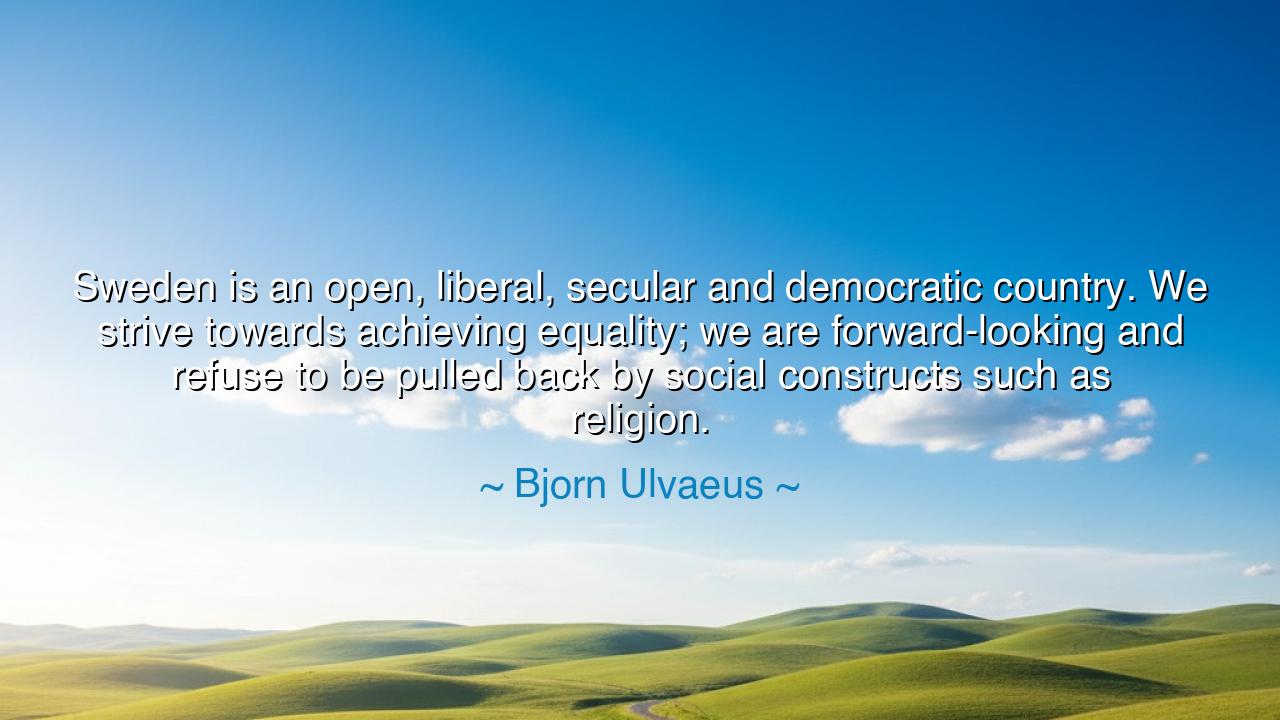
Sweden is an open, liberal, secular and democratic country. We
Sweden is an open, liberal, secular and democratic country. We strive towards achieving equality; we are forward-looking and refuse to be pulled back by social constructs such as religion.






In the ancient and timeless journey of humanity, the struggle for freedom, equality, and the refusal to be bound by the chains of outdated social constructs has been one of the greatest challenges to face. Björn Ulvaeus, with his words, captures the essence of this struggle as it plays out in modern times: "Sweden is an open, liberal, secular and democratic country. We strive towards achieving equality; we are forward-looking and refuse to be pulled back by social constructs such as religion." These words, as both a declaration and a vision, speak to the heart of a society that seeks to move beyond the limitations imposed by tradition and doctrines, forging a future where all are valued equally and can live freely, unshackled by the constraints of old beliefs.
In the ancient civilizations, societies were often governed by rigid social structures and belief systems that dictated every aspect of life—who could rule, who could speak, and who was entitled to freedom. The Greeks, with their ideals of democracy and philosophical inquiry, made great strides toward challenging the traditional dogmas of their time. Yet even in Athens, the land that birthed the very notion of democracy, equality was limited to a select few—free men. Women, slaves, and foreigners were denied the rights that their fellow citizens enjoyed. The battle for universal equality—for a society where all could be truly free from the oppression of social constructs—was still far from won. But in their philosophical quest, they planted the seeds for the idea that the pursuit of truth, not blind adherence to tradition, would lead to a more just world.
Björn Ulvaeus's vision of Sweden embodies this ancient ideal. His statement reflects a society that is not content to accept tradition as the end-all but strives to break free from the restraints of outdated and often oppressive systems, such as religion, that have historically limited personal freedom and equality. Sweden, with its deep commitment to secularism and democracy, refuses to be pulled back into the past, seeking instead to create a future where each individual can live in equality, without the weight of societal norms that have long been used to divide and control. The country’s dedication to the ideals of liberalism and secularism ensures that every person, regardless of their gender, religion, or identity, is given the opportunity to live freely and equally.
Look to the history of the Enlightenment, when thinkers like Voltaire and John Locke challenged the centuries-old power of the church and monarchy over people’s lives. The Enlightenment was a period when reason, science, and individual rights began to challenge the old systems of control. Voltaire's famous call for religious freedom and the separation of church and state was a battle cry for the freedom of thought and the equal treatment of all people under the law. Just as these ideas spurred revolutions and reforms across Europe, so too does Sweden's modern vision represent the culmination of that struggle—a society that refuses to be bound by the limitations of social constructs such as religion, and instead places the value of equality and human rights at its core.
Consider the Swedish model of gender equality, where policies have been implemented to ensure that men and women have equal opportunities in the workplace and home. Sweden was one of the first countries to introduce comprehensive parental leave, recognizing the need to support both men and women in sharing the responsibilities of raising children. The Swedish government continues to push forward with policies aimed at reducing inequality, whether through social welfare, education, or healthcare. This commitment to equality and the elimination of outdated constructs is the modern manifestation of the ideal that Ulvaeus speaks of—a society where equality is not a lofty ideal but a practical reality.
The lesson to be drawn from Ulvaeus' words is one of unwavering commitment to the ideals of freedom, equality, and progress. For as Sweden demonstrates, true democracy and liberalism cannot thrive unless society is willing to question and challenge the systems of power that restrict human potential. When we allow ourselves to be guided by outdated social constructs, we imprison ourselves in a world where the full potential of every individual cannot be realized. Ulvaeus's call is a reminder to each of us that we must not be content with the world as it is but must continually strive to build a future where everyone, regardless of their background or identity, has the opportunity to live freely and equally.
In our own lives, let us take Sweden's example to heart. Whether in our communities, workplaces, or personal relationships, we must constantly challenge the social constructs that divide and limit us. Let us create spaces where equality, freedom, and mutual respect are the foundations upon which we build, where each individual is given the opportunity to flourish without being weighed down by the biases and constraints of the past. Just as Sweden moves forward into the future, so must we, never allowing ourselves to be held back by the constructs of the past, but always striving for a world where equality is a living, breathing reality for all.






AAdministratorAdministrator
Welcome, honored guests. Please leave a comment, we will respond soon